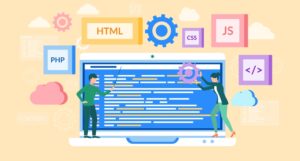Building Scalable Web Applications with Python: Best Practices
Introduction: Python’s Role in Scalable Web Development
Python for scalable web applications: Python has emerged as a go-to programming language for building scalable web applications, thanks to its simplicity, versatility, and robust frameworks. Whether you’re a seasoned developer or just beginning your journey, Python offers a comprehensive ecosystem to support growth-driven projects. For a web developer with AI integration expertise, Python is especially powerful, combining scalability with cutting-edge technologies like machine learning.
Why Choose Python for Scalable Web Development
1. Extensive Frameworks for Rapid Development
Python boasts powerful web frameworks such as Django and Flask, enabling developers to build robust applications quickly. Django is a high-level framework designed for scalability and rapid development, with built-in features like authentication and an admin panel. Flask, on the other hand, is a lightweight framework that allows greater flexibility and customization for developers. External Link: Explore Django vs. Flask to determine which framework suits your project.
2. Python’s Integration with AI and Machine Learning
As a web developer with AI expertise, Python provides access to libraries like TensorFlow, PyTorch, and Scikit-learn. These tools enable seamless integration of AI-driven features, such as predictive analytics and chatbots, into web applications.
3. Scalability with Asynchronous Programming
Libraries like Asyncio allow developers to handle multiple requests simultaneously, ensuring better performance for high-traffic applications. Python’s compatibility with containerization tools like Docker further enhances scalability.
Best Practices for Scalable Python Web Applications
1. Modular Design and Code Organization
Divide your application into smaller, reusable modules to simplify maintenance and updates.
2. Optimize Database Queries
Use Object-Relational Mapping (ORM) tools like Django ORM or SQLAlchemy to reduce query complexity.
3. Embrace Caching Strategies
Caching tools like Redis and Memcached can significantly improve application speed by storing frequently accessed data. Internal Link: Need professional help? Contact us for expert web development services.

Python for Backend Development
API Development
Python’s frameworks make API creation seamless. Tools like Flask-RESTful simplify designing RESTful APIs for scalable web applications. External Link: Check out API Development with Python for detailed insights.
Handling Real-Time Data
Python supports WebSockets, enabling real-time updates for dynamic applications like chat platforms and dashboards.
Integrating AI with Python for Scalability
AI can transform web applications, making them more efficient and personalized. Examples include recommendation systems that suggest products or content based on user behavior, chatbots that provide real-time customer support, and data analytics that generate insights for better decision-making.
Conclusion: The Future of Web Development with Python
Python is more than just a programming language; it’s a platform for innovation. Its ability to integrate seamlessly with AI and adapt to complex requirements makes it an essential tool for any web developer with AI capabilities. By following best practices and leveraging its robust ecosystem, developers can build scalable and future-proof applications. Ready to scale your web application with Python? Contact us today to discuss your project.
External Resources
Flask Documentation
Django REST Framework
Explore more related articles to deepen your understanding and make informed choices about graphic design techniques
WordPress Website Developer: Expert Solutions for Your Online Presence
Custom WordPress Development: Tailored Websites for Your Business







